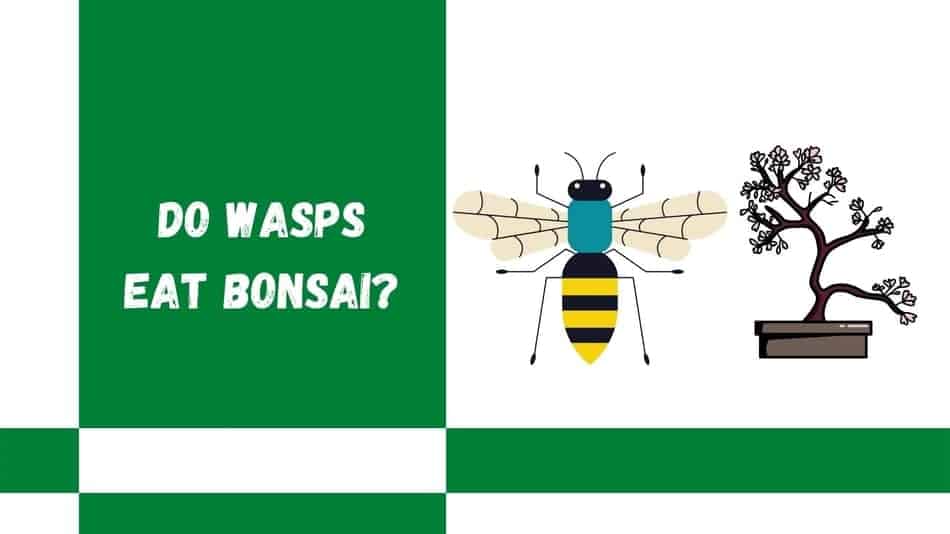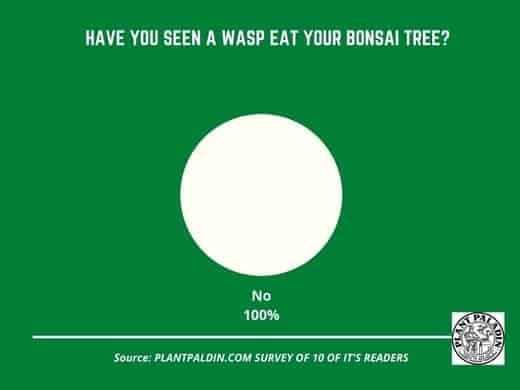This website is supported by its readers. If you click one of my links I may earn a commission. I am also a participant in the Amazon affiliates program and I will also earn a commission from qualified purchases.

One of the most common insects out there regardless of the country you are in is wasps. With an estimated 150,000 species they are a very common sight during the spring and summer. Naturally, this leads to the question of do waps eat bonsai trees?
Wasps do not eat bonsai trees, instead, they feed on honeydew and nectar that some flowers and insects produce. Wasps are beneficial to bonsai trees and feed on common pests such as aphids or scale.
So are there any bonsai species that wasps eat? And what exactly are the advantages of using wasps for your bonsai? Keep reading to find out more!
Just a quick heads up, over the past three years of running Plantpaladin, hundreds of people have asked for product recommendations. As such, You can find my favorite indoor bonsai tree here (link takes you to Bonsaiboy), my favorite outdoor bonsai tree (link takes you to Bonsaiboy), or have a look at all the products I recommend here.
Do wasps eat bonsai trees?
With bonsai trees becoming more and more popular and wasps being a common (and sometimes quite annoying) part of spring and summer, finding out if they eat or attack bonsai trees is an important question to ask.
As such, I spoke with a few experts at my local botanical garden and did a quick survey of ten plant paladin readers to find out the truth.
To summarize:
- Wasps generally, do not eat bonsai trees.
- They can however sometimes be attracted to bonsai, particularly if you have a flowering bonsai tree or fruiting bonsai that produces sweet nectar that wasps eat.
- The most likely reason wasps are attracted to your bonsai tree, is due to a pest infestation on your tree.
- Pests such as aphids or scale secret honeydew which wasps are attracted to and consume.
- Other commonplace pests such as caterpillars, whiteflies, and spider mites too are eaten by wasps.
Are wasps beneficial for bonsai trees?
Wasps, or more specifically, parasitic wasps in particular can prove beneficial for bonsai keeping.
Chalcid wasps and Braconid Wasps in particular are known for consuming pests specifically and have the added benefit of not stinging, meaning you won’t get caught in any crossfire.
These wasps then are specifically bred and often sold by garden centers to hunt down and kill any pests that might be damaging or eating your bonsai tree.
How to attract parasitic wasps for your bonsai?
To attract parasitic wasps to your garden to protect your bonsai, plant flowers that produce a lot of nectar such as daisies near your bonsai tree. Alternatively, provide shallow, level pools of water near your bonsai trees that will allow them to drink.
I found that using a bird feeder works well for this.
The wasps then will consume the water or nectar your provided and also be attracted to the pests that are eating your bonsai tree.
Another good method would be to buy parasitic wasps eggs from a garden store and plant them in your bonsai tree before they hatch.
When they do, they will be happy to eat any pests that are attacking your tree.
Parasitic wasps then can make for a fantastic bonsai tree gift idea.
When are wasps more likely to attack your bonsai tree?
Wasps are more likely to attack your bonsai trees during the spring and summer. This is because the scale, aphids, and other pests they feed on are readily available during this time of the year.
Interestingly., wasps during the early spring are a lot more mellow than they are in the late summer or early fall.
This is because wasps are on a mission is to provide nectar for their queen.
By the end of the summer, the job is complete and they have no real purpose in life.
This is why wasps are much more likely to attack you and be more aggressive in general during the summer than in the early spring
What bonsai trees do wasps eat?
Wasps do not eat bonsai trees or plant material in general. instead opting to consume pests such as aphids, scale, and other insects that feed on bonsai trees.
That being said, if you have a fruiting or flowering bonsai such as cherry, willow, or plumb, it can be quite commonplace to see both wasps and bees eating the nectar from their nectar glads.
Even non-fruiting or flowering bonsai trees such as Chinese elm can sometimes find wasps near them.
This is most commonly due to the high amount of pollen that these trees produce.
How to prevent wasps from coming near your bonsai?
Whilst wasps are beneficial to bonsai trees, fear of wasps is common.
As such, if you want to prevent wasps from coming near your bonsai tree collection there are a few things you can do:
- Remove any pests from your tree – If you move their food source, wasps won’t be as attracted to your tree
- Move your tree indoors – species such as jade or ficus work well indoors.
- Avoid fruiting bonsai – Olive, cherry, or other fruiting bonsai trees are more likely to produce nectar which wasps like
- Strong-smelling herbs -These will be offputting to wasps, especially if you keep them near your bonsai.
- Use sugar to your advantage – place a sugar dense food or drink such as orange justice in the bottom of your garden – this will distract wasps from your bonsai.
- Use soapy water – using a mix of liquid soap and a spray bottle will kill waps.
Study on if wasps eat bonsai trees
Finally, I wanted to finish up by asking 10 plant paladin readers if they have seen a wasp eating their bonsai tree.
Here were the results:

My top picks for the gear you will need!
So like I mentioned earlier, over the past three years of running PlantPaladin, hundreds of people have asked me for my recommendations on the best bonsai gear on the market.
Having spent thousands of dollars on bonsai items these past few years and tested at least 100 bonsai-specific products, I’ve listed my favorite products below – All of which I highly recommend and think you can get great value.
They can purchase directly by clicking the link to take them to Amazon.
Bonsai Tool Set: One of the significant challenges I’ve had is finding a toolset that was not only durable but didn’t break the bank. SOLIGT has recently developed a fantastic bonsai tool set that covers all the tools you need to trim, prune, and repot your trees. – You can grab it here.
Complete Bonsai Set: Many of you will want to grow your bonsai trees entirely from scratch, but finding the varicose seeds, pots, and other items in one place can be challenging. Leaves and Sole then have created a complete bonsai set that I’ve personally used that ticks all the boxes. You can grab it here.
Bonsai wire: The number of times I’ve run out of wire for my bonsai or purchased cheap bonsai wire that doesn’t do the job is embarrassing for me to admit. After a lot of trial and error, I found that using Hotop’s aluminum bonsai wire is one of the best options on the market. This can easily be used for both indoor and outdoor bonsai. You can grab it here.
This post was written by Fehed Nicass who has been passionate about bonsai for over 3 years.
